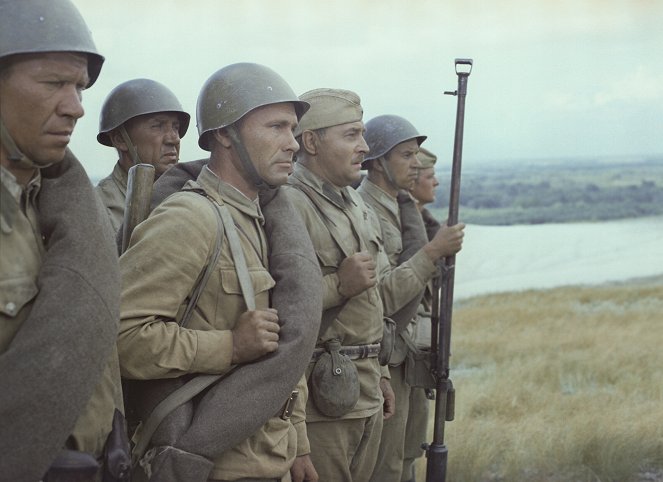Inhalte(1)
July 1942. The army is retreating. A group of exhausted soldiers, all that's left of their regiment, are defending a plot of land. At times they feel like there is no war. Wide tank tracks on the road, and all around are drooping, wilted grasses, dimly glistening salt marshes and a bluish flickering haze over distant mounds...In that absurd clash between the warmly breathing earth and the inhuman war machine lies a powerful Biblical generalization, the metaphor of confrontation of eternal life and dark, evil forces... (Verleiher-Text)
(mehr)Kritiken (2)
Does a film that almost has an 80% rating on FilmBooster deserve only one star? Let me ask the question differently. Do I deserve to lose almost three hours of time at my age watching a pompous and exhausted propaganda spectacle? Or, wouldn't it be worth it for other users to take off their blinders, get rid of nostalgia, and watch these old works again? In some cases, this could lead to a fundamental reassessment of current impressions. Over a few days, I watched Bondarchuk's debut Fate of a Man, and then this film, which can be considered a total artistic defeat, as Bondarchuk suppressed everything progressive and directed an educational film full of pathos, attempting to construct the myth of the Soviet man and a propagandistic offspring of the official Soviet cinema of the 70s. If I am bothered by the ubiquitous patriotism and glorification of American heroism in famous American war films, such as Spielberg's drama Saving Private Ryan, here I am reminded to a large extent of the slogan of voucher privatization. Bondarchuk doesn't even avoid having incredible tragicomic scenes, such as repeated cuts to the face of a frightened German soldier confronted with a pathetic expression and burning eyes of a Soviet soldier moving forward, or a German unit calmly marching along the road in the middle of a fierce tank battle under the leadership of a drunken officer. The rest of my family gathered in front of the screen and watched incredulously, then asked uncertainly if it was a parody. At the same time as when this film came out, completely different processes were taking place in world cinema and top-notch works were being created. Here, under state supervision, time stopped, or rather, returned to the 50s. The attempt to focus on the personal characters of the soldiers sounds worn out and boring, the choreography of the battles is incredibly dull, and you can't help but think of traditionally undernourished European television production, represented, for example, by the German BRD trilogy, which presents only one tank as the pinnacle of its offer. However, it is filmed inventively and beats Bondarchuk's film by several classes. It really is not about money and the amount of military equipment but about courage, cleverness, and skill. Overall impression: 25%.
()
Let's not kid ourselves, the Soviets/Russians simply knew how to, and perhaps still know how to, make a war film. It's not just about their mastery of battle scenes, where they never disappoint; they excel even more in portraying relational dramas and especially in character development, which is sometimes beautifully poetic, thanks to the subtle camera work that shines here.
()
Galerie (17)
Photo © Mosfilm


Werbung